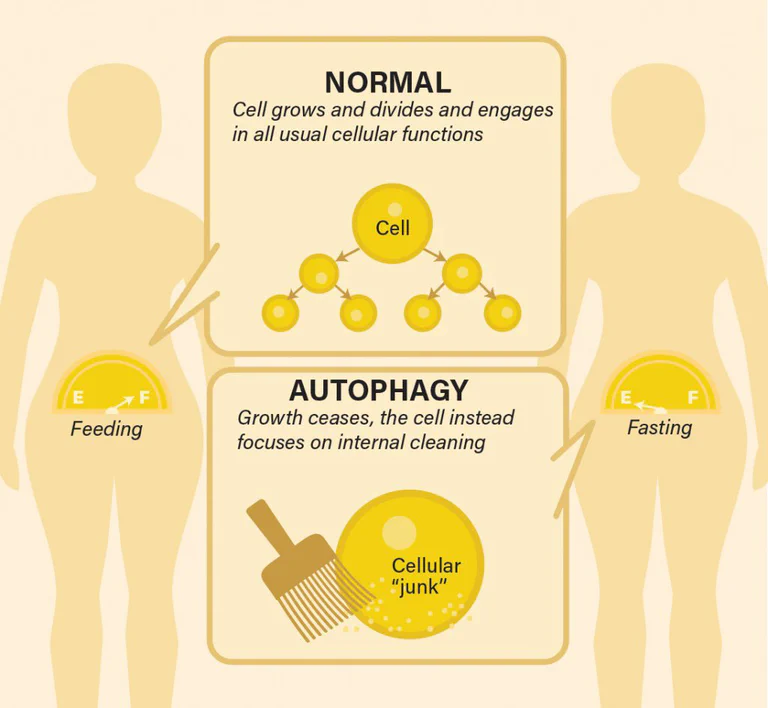Table of Contents
The Nobel Prize They Hope You'll Forget
In 2016, something remarkable happened in medicine. Yoshinori Ohsumi won the Nobel Prize for his work on autophagy—the process by which your body repairs itself at the cellular level when you stop eating.
The implications were staggering: We have a built-in healing system that modern medicine had largely ignored.
But seven years later, how many doctors prescribe fasting? How many medical schools teach autophagy as frontline therapy? The silence is deafening.
This isn't just another health trend. This is a medical revolution that threatens the fundamental business model of modern healthcare: What if the most powerful therapies are free?
The Science They Can't Deny
What Ohsumi Discovered
Autophagy (from Greek: "self-eating") is your body's sophisticated recycling system. When activated, it:
- Hunts damaged components - targeting everything from misfolded proteins to dysfunctional mitochondria
- Packages them for disposal - creating specialized containers called autophagosomes
- Breaks them down systematically - using cellular "recycling centers" called lysosomes
- Rebuilds with precision - creating new cellular components from the raw materials
As one comprehensive review in Ageing Research Reviews confirmed: "The effect of fasting or calorie restriction on autophagy induction represents a fundamental cellular renewal process with profound implications for disease prevention and treatment" (ScienceDirect, 2018).
The Fasting Trigger
Your cells operate on a simple but profound principle: growth or repair, but not both simultaneously.
- mTOR pathway: The "growth switch"—active when nutrients are abundant
- AMPK pathway: The "repair switch"—activated when energy is low
The crucial insight: Every time you eat, you're telling your body to grow. Every time you fast, you're telling it to repair.
The Evidence They Can't Ignore
The Timing Data
Research shows autophagy begins within 12-24 hours of fasting and increases significantly by 48-72 hours. As a landmark study in Cell Metabolism demonstrated: "System-wide benefits of intermeal fasting are mediated by autophagy and have profound implications for metabolic health" (Cell, 2017).
The Inflammation Connection
Chronic inflammation is the root of most modern diseases. Fasting-induced autophagy directly addresses this by "remodeling innate immunity" and reducing inflammatory markers (Aging Cell, 2021).
The Metabolic Reset
Studies on liver autophagy show how fasting can dramatically improve insulin sensitivity and metabolic function—offering hope for the diabetes epidemic (Bioscience Trends, 2023).
The Cancer Research
Even oncology is taking notice, with studies suggesting fasting may enhance chemotherapy effectiveness while protecting healthy cells (Clinical Nutrition, 2020).
The Medical Establishment's Awkward Silence
The Pharmaceutical Problem
Fasting presents a fundamental challenge to the pharmaceutical business model:
- No patent potential - You can't patent not eating
- No prescription required - Patients can implement it themselves
- No profit stream - It costs nothing but discipline
- Competes with drugs - May reduce need for diabetes, inflammation, and metabolic medications
The Clinical Evidence Gap
While the basic science is robust, large-scale clinical trials are scarce. But ask yourself: Who would fund a study of a free intervention that could make expensive drugs obsolete?
The Work of Brave Clinicians
Doctors like Dr. Joseph Lee have been quietly using fasting protocols with remarkable results, particularly for respiratory and inflammatory conditions (Vimeo, 2022). Their work exists largely outside the mainstream medical literature.
Traffic-Light Snapshot: Medical Dogma vs Scientific Reality
"Fasting is dangerous starvation"
- Medical Claim: Skipping meals triggers harmful stress responses
- Scientific Evidence: Controlled fasting activates beneficial stress responses (hormesis)
- Verdict: ❌ Medical education conflates starvation with strategic fasting
"You need frequent meals for stable metabolism"
- Industry Position: Grazing maintains stable blood sugar
- Research Reality: Constant eating disables metabolic flexibility and cellular repair
- Verdict: ❌ Food industry interests have shaped medical advice
"Fasting causes muscle loss"
- Common Warning: Body cannibalizes muscle for energy
- Hormonal Evidence: Growth hormone increases 300-500% during fasting, preserving muscle
- Verdict: ❌ Misunderstanding of human metabolic adaptations
"Only supervised medical fasting is safe"
- Gatekeeping Argument: Requires professional oversight
- Historical Context: Humans evolved with regular fasting periods
- Verdict: ⚠️ Medical supervision helps for extremes, but basic fasting is inherently safe
The Bigger Pattern: What This Reveals About Healthcare
The suppression of fasting and autophagy knowledge fits a disturbing pattern:
- Natural solutions are ignored while synthetic drugs get billions in research
- Profitable interventions are promoted while free ones are dismissed as "alternative"
- Patients are made dependent on continuous treatments rather than empowered with cures
- The root causes of disease are ignored in favor of symptom management
The Human Cost: Stories They Don't Want You to Hear
Behind the scientific debates are real people:
- The type 2 diabetics who reversed their condition through fasting after drugs failed
- The autoimmune patients who found relief when pharmaceuticals offered only side effects
- The cancer patients using fasting to better tolerate chemotherapy
- The millions with "mystery" inflammatory conditions that improve when they stop eating constantly
What Proper Medical Integration Would Look Like
- Medical Education Reform: Teach autophagy and fasting as frontline therapies
- Clinical Guidelines: Develop evidence-based fasting protocols for common conditions
- Insurance Coverage: Reimburse fasting coaching and monitoring
- Public Health Campaigns: Educate about the benefits of intermittent fasting
- Research Funding: Prioritize studies of free interventions alongside drug development
The Unanswered Questions—And Why They're Not Being Asked
- How many pharmaceutical dollars would be lost if fasting became standard medical practice?
- Why has medical education so thoroughly ignored this Nobel Prize-winning science?
- What role has the food industry played in shaping "eat frequently" dietary guidelines?
- How many patients are being kept on expensive drugs when free interventions might work better?
This investigation into fasting and autophagy reveals more than just a health strategy—it exposes the fundamental conflicts of interest in modern healthcare. When the most effective therapies are free, the entire medical-industrial complex has a problem. The question isn't whether fasting works; it's why the medical establishment has been so reluctant to tell you about it.


